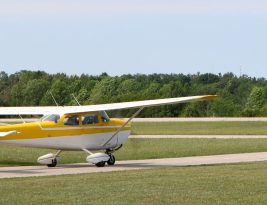14 CFR 91.171, “VOR Equipment check for IFR Operations”—a friendly reminder on this week’s Learn to Fly Blog to check the accuracy of your VOR equipment per §91.171! Sometimes in the excitement of getting wheels up and on to your destination a VOR accuracy check can often be overlooked. Even if
…Category: Navigation
View All CategoriesThis Thursday, we’ll pick up where we left off with flight planning last week, but today we have a post on another cockpit navigation aid: the automatic direction finder (ADF). This post is excerpted from the Pilot’s Handbook of Aeronautical Knowledge.
Many general aviation-type aircraft are equipped with ADF
…The fundamentals of visual navigation include two main methods as discussed in Monday’s post, pilotage and dead reckoning, each of which should be used in conjunction with the other. Whether flying by means of visual navigation or even by reference to instruments like a VOR it is
…Today, we’ll put together a few things we’ve learned on the Learn To Fly Blog to introduce a skill every beginning student should develop: thinking in terms of a wind triangle. Check out last week’s posts on magnetic variation and using your E6B Flight Computer to
…Global Positioning System (GPS) is a United States satellite-based radio navigational, positioning, and time transfer system operated by the Department of Defense (DoD). The system provides highly accurate position and velocity information and precise time on a continuous global basis to an unlimited number of properly-equipped users. The system is
…We’ve had a few posts about the Very High Frequency Omnidirectional Range (VOR). Take a look at our introduction and at our CFI’s posts on VOR service volumes and a couple questions that might show up on your exam. Today, we’ll
…VORs are anything but standard. When operating under the guidance of radio navigational aids like a VOR it’s important to understand the restrictions and standard service volumes (SSV) associated with each aid of intended use. VOR standard service volumes are designated in three classes: Terminal (T), Low Altitude (L), and
…We’re devoting this week’s posts to the VOR, a radio navigation system used worldwide by private and commercial pilots. This introduction comes from The Student Pilot’s Flight Manual, by William Kershner.
The most useful of the enroute radio navigation aids, other than GPS, is the VHF omnirange,
…

